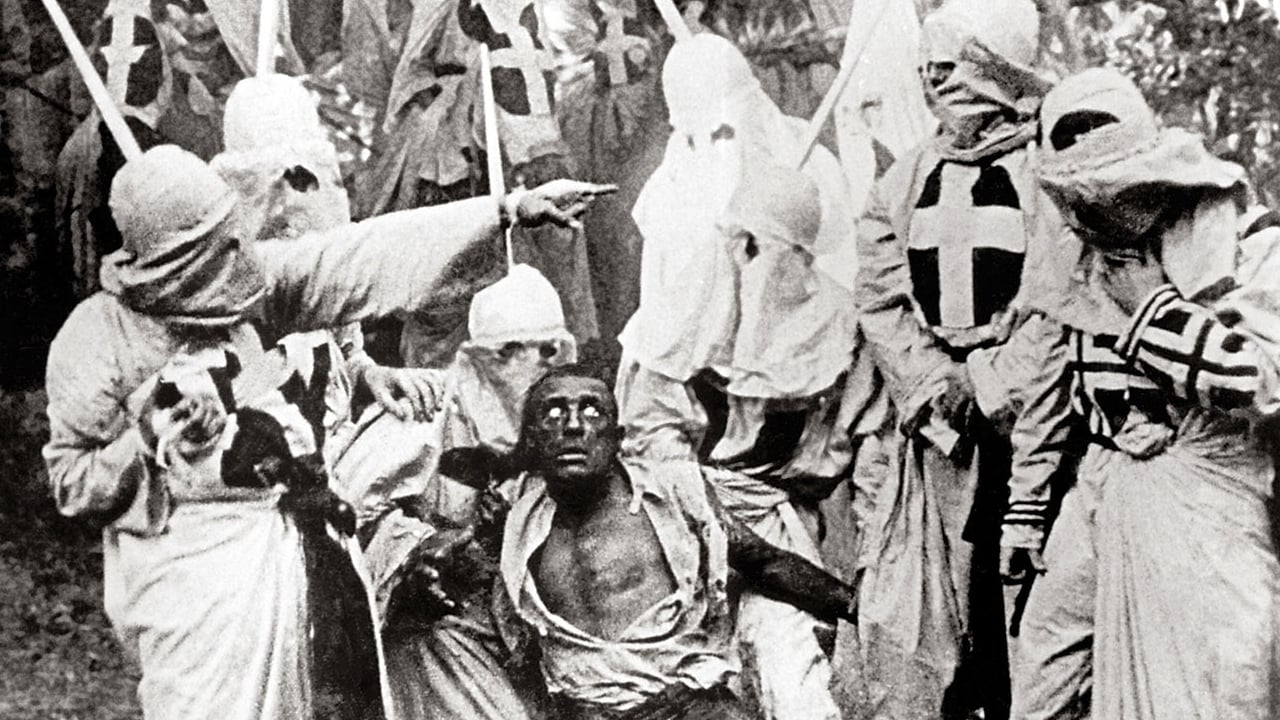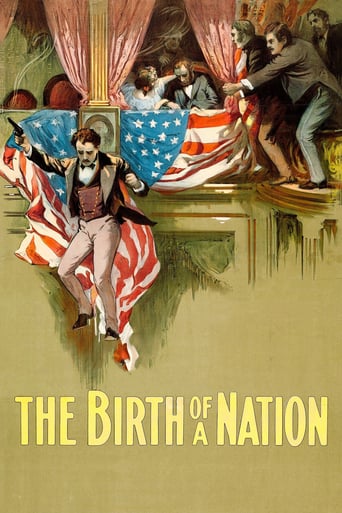



Self-important, over-dramatic, uninspired.
Absolutely Brilliant!
I cannot think of one single thing that I would change about this film. The acting is incomparable, the directing deft, and the writing poignantly brilliant.
View MoreIt was OK. I don't see why everyone loves it so much. It wasn't very smart or deep or well-directed.
View MoreWe can see how Griffith's mind works and how he seen the world. If today somebody make a movie that much racist doesnt matter how beatiful it is i wouldnt like it. For me nothing change its old movie or new movie. If i look as a part of history and how some of the people were thinking that time, its good source for that. He was racist and so many people as like him that time. All that civil war happened cause of that. His belive his mind shaped with those belives. If 1 Nazi director made a movie how they were right about the Jewish massacre i cant imagene no one even talk about how its piece of art. He has natural talent every picture on the movie looks like painting. Big war sceens and good acting. Still i cant give high point.
View MoreIs this film politically incorrect? Absolutely. Was it influential? Yes. Is it historically inaccurate? For the most part, yes. Film is considered art and art has always been considered controversial. This was the first film to gain significant controversy and it wouldn't be the last. The film saying that all blacks are murderers and rapists is no different than Donald Trump saying all illegal immigrants are murderers and rapists. This film came out in 1915, Donald Trump made that controversial statement in 2016, 101 years later. Things clearly haven't changed. You need to be aware that this film is racist or else it might be a bad influence on you. Yes, the movie does portray the KKK as heroic, it does make it seem all blacks are vicious rapists, but I don't believe in banning this movie because it would be the same as trying to pretend this kind of racism and racial prejudice never existed. It should be shown so people can learn from the past and never make those same mistakes again. As for the black face makeup, that was sadly a product of its time, most black characters in movies back then were portrayed by white actors wearing black face paint, it was racist back then and it's racist now. Even though it was politically incorrect, there was no film like this at the time in terms of production and editing. It was the first time people began to take a motion picture seriously. The movie was seen as a book in moving pictures full of drama, excitement, romance and heartbreak. It's just unfortunate one of the most influential movies in history also happens to be the most controversial. If you are aware that this film is nothing but anti-black propaganda, then this movie probably won't turn you into a racist. Almost every open minded person knows that the KKK is a horrible organization that should have never existed. But you should appreciate this movie more for its art and production rather than its message. There's been plenty of other stories with bad messages. Grand Theft Auto V is a video game about trying to become a successful criminal and that game has sold extremely well. This movie should only be seen by those mature and open minded enough to know how racist it is. It shouldn't be seen by a young mind who doesn't know right from wrong.
View MoreThe movie is based on the revisionist history "Birth Of a Nation". Anyone who rated this as anything but a "1/10" really needs to question himself or herself—for example, how would he or she rate a propaganda film that was made by Leni Riefenstahl? If you wouldn't rate a Riefenstahl film with anything above a "1/10", you shouldn't be rating "Birth Of a Nation" as anything above a "1/10".
View MoreBased on the 1905 novel "The Clansman" by Thomas F. Dixon, Jr., this silent film epic is as brilliantly made as it is incredibly racist. It has often been hailed as one of the most important films in cinematic history because of the techniques that its director D. W. Griffith, a master of his craft, pioneered while working on it. Many of the techniques that audiences now take for granted such as long shots, pan shots and frequent use of intercutting made their first appearance here. The battle scenes are thrilling, beautifully staged and surprisingly violent for the time. The script by Griffith and Frank E. Woods is very well structured and, while it inspired many feelings in me, boredom was not one of them. The film depicts a version of the United States, North and South, and its people, black and white, which only ever existed in the minds of bitter Southerners. Its warped, ahistorical treatment of race relations led to widespread protests by the NAACP, riots in several major cities and, according to one report, the murder of a black teenager by a white man as a direct result of the latter watching the film (though the evidence is less than conclusive). The film has also been blamed for contributing to the revival of the Ku Klux Klan, which had essentially ceased to exist in the 1870s but returned with a vengeance over the course of the next few years. The storyline follows two families, the Northern Stonemans and the Southern Camerons, who are acquainted as a result of the fact that the eldest sons attended boarding school together. The film's first half concerns the prelude to the Civil War and the war itself while the second concerns Reconstruction. Austin Stoneman, played by Ralph Lewis, is the Speaker of the House of Representatives and a thinly veiled version of the Radical Republican Congressman Thaddeus Stevens, even possessing a club foot. Like Stevens, Stoneman is not only an abolitionist but believes that blacks and whites are equal. As such, he is one of the major villains of the piece. The other major villain, his biracial protégé Silas Lynch, does not appear until the second half but he is depicted as being a truly evil, venomous character who seeks to create a Black Empire in the South with himself as its king. The only other African-American shown to have any real intelligence is Stoneman's housekeeper Lydia Brown, who is likewise biracial. Based on Stevens' housekeeper and alleged lover Lydia Hamilton Smith, she only appears briefly but she is clearly intended as a Lady Macbeth type who manipulates Stoneman into going along with her ideas of equality. Most of the other black characters are depicted as being ultra- violent, cruel, detestable and sometimes little more than animals. In one particularly disturbing scene, a black renegade named Gus - played by Walter Long in blackface - attempts to rape the fragile waif Flora Cameron, ultimately driving her to commit suicide. The implication of this scene is clear: black men will rape and kill every white Southern woman unless the KKK does something about them. It's one of the most sickening sequences in a film which has no shortage of them, particularly in its second half. The only black characters portrayed in a sympathetic light are the Camerons' "faithful souls" - perfect illustrations of the Mammy and Uncle stereotypes - and various slaves who were much happier before they were freed. The majority of the black characters are played by white actors in blackface but there are many black extras in the background. They were probably glad to get some work but I have to wonder what they thought of the film, especially Madame Sul-Te-Wan whose parents were freed slaves.Although the film is perhaps best remembered for its glorification of the KKK, they do not actually appear until 2 hours and 5 minutes into the 3 hour and 13 minute running time but they certainly make their presence felt after that. They are described as "the organisation that saved the South from the anarchy of black rule" and that really says it all when it comes to the film's attitude towards them. They are depicted performing several supposedly heroic feats such as hanging Gus, dumping his corpse on Lynch's doorstep and rescuing the bound and gagged Elsie Stoneman before she can be forced into marrying Lynch. The Klan's founder is Elsie's lover Ben Cameron, otherwise known as "the Little Colonel."One thing that surprised me was the fact that Abraham Lincoln was treated very positively with Dr. Cameron even describing him as "our best friend" when it comes to Reconstruction. There are some moments that seemed genuine such as Phil Stoneman and Margaret Cameron's shy interaction when they first meet and Elsie putting on a brave face as her three brothers leave for war before bursting into tears the moment that they leave. It's a lovely little moment which is wonderfully acted by Lillian Gish. Although most of the characters are misconceived to some degree, the film nevertheless has a very strong cast: Miriam Cooper as Margaret, Henry B. Walthall as Colonel Cameron, Mary Alden as Lydia Brown, Ralph Lewis as Stoneman, Elmer Clifton as Phil, Spottiswoode Aitken as Dr. Cameron and Josephine Crowell as Mrs. Cameron.Overall, neither the importance of the film nor its racism have been exaggerated. I think Roger Ebert said it best: "Like Riefenstahl's 'The Triumph of the Will', it is a great film that argues for evil. To understand how it does so is to learn a great deal about film, and even something about evil."I'm sort of torn about how to rate this film. In terms of quality, I'd give it 10/10. If I were to rate it in terms of morality (something that I have never done before and may never do again), I'd give it 0/10.
View More